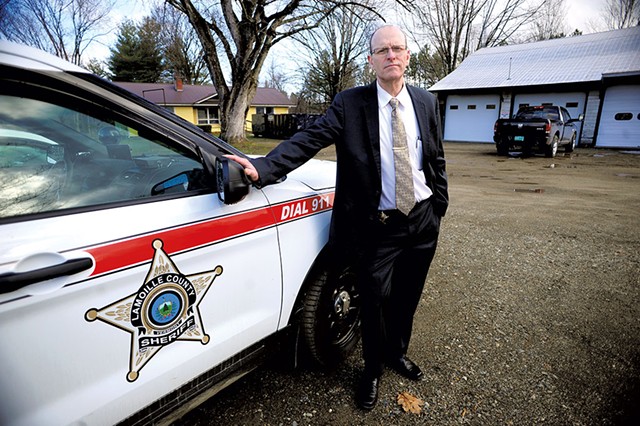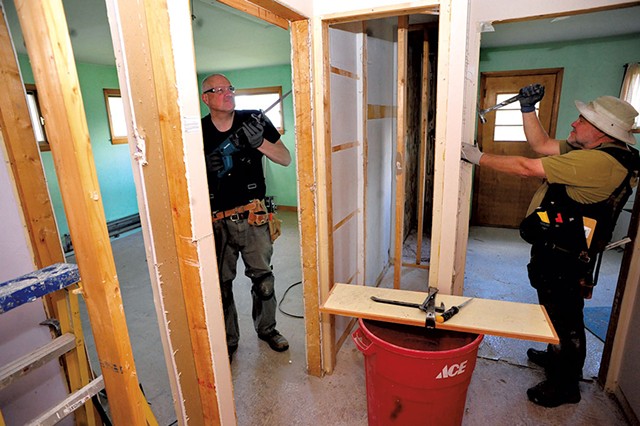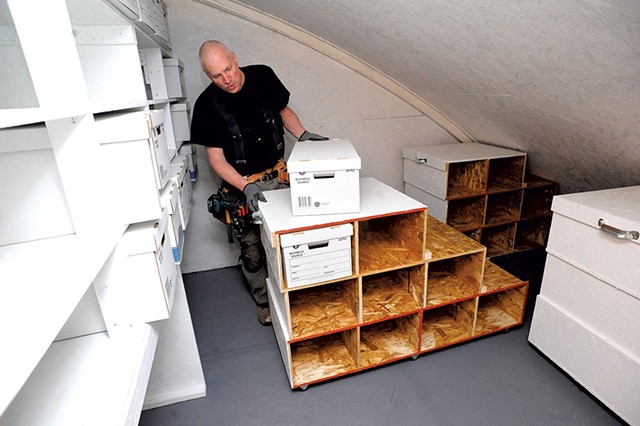Switch to the mobile version of this page.
Vermont's Independent Voice
- News
- Arts+Culture
- Home+Design
- Food
- Cannabis
- Music
- On Screen
- Events
- Jobs
- Obituaries
- Classifieds
- Personals
Browse News
Departments
Browse Arts + Culture
View All
local resources
Browse Food + Drink
View All
Browse Cannabis
View All
-
Culture

'Cannasations' Podcaster Kris Brown Aims to 'Humanize'…
-
True 802

A Burlington Cannabis Shop Plans to Host…
-
Business

Judge Tosses Burlington Cannabiz Owner's Lawsuit
-
Health + Fitness

Vermont's Cannabis Nurse Hotline Answers Health Questions…
-
Business

Waterbury Couple Buy Rare Vermont Cannabis License
Browse Music
View All
Browse On Screen
Browse Events
View All
Quick Links
Browse Classifieds
Browse Personals
-

If you're looking for "I Spys," dating or LTRs, this is your scene.
View Profiles
Special Reports
Pubs+More
Vermont Sheriff Risks His Career by Hiring a Sex Offender
Published April 27, 2016 at 10:00 a.m.
WARNING: This story describes the sexual abuse of a child.
Skill saws screamed, drowning out Top 40 country music tunes while two men labored to transform a run-down garage in the village of Hyde Park. The lead carpenter on the job, Timothy Szad, showed off his work in what will become an evidence room for the Lamoille County Sheriff's Department. Szad, 56, explained that the gun racks he's building will hold firearms that have been seized by police. To make sure the slots are the right size, he made a wooden replica of a pistol.
Szad isn't allowed to possess a real firearm, even for a few minutes. No one on the sex offender registry is.
According to his employers, Szad is a gifted carpenter and diligent worker. He is also Lamoille County's most notorious criminal. In 2000, Szad stalked and sexually assaulted a 13-year-old boy in the southern Vermont woods. He went to jail for his crime and served the maximum sentence. But his punishment didn't end when he got out, in 2013. His release was widely publicized, which generated something of a vigilante reaction. So he embarked on a cross-country journey in search of a new home. When no place would have him, he wound up back in Vermont — this time, in sleepy Hyde Park.
The reception was predictable. Local residents circulated a poster with his photo on it, and some demanded that he leave. People took out no-trespass orders against him, filed false reports of Szad committing new crimes and even affixed an image outside his home that showed him hanging from a noose.
But the outcry died down after Lamoille County Sheriff Roger Marcoux Jr., who grew up on a local dairy farm, did something unexpected: He welcomed Szad. Marcoux met with him, talked to him, took an interest in his life. The sheriff told the sex offender he would look out for him, as long as Szad kept out of trouble.
"I had a responsibility to protect him as much as to protect people from him," Marcoux said.
Szad described his police sponsor as "like a big brother."
Several months ago, however, Marcoux went further. He hired Szad to renovate buildings that will serve as the sheriff's department office.
Five days a week, Szad and his roommate are building a new evidence storage room, installing a handicapped-accessible bathroom and renovating garage bays for Marcoux's cruisers.
Marcoux said the plan allows him to keep an eye on Szad while allowing Szad to build a life that he won't want to jeopardize by reoffending.
"People want him to fail. They want to get him out of their neighborhoods," Marcoux said. "But if you've got somebody willing to establish a rapport, and you can keep engaging with him, it's better. It's about making sure Tim doesn't have any more victims."
The men have reached an improbable, and uneasy, alliance that has left Szad hopeful and Marcoux nervous: The sheriff is putting his trust in a man who, while he owns up to his crimes and says he wants to repair his life, still doesn't completely trust himself.
"I still have sleepless nights," Marcoux said. "What if I'm wrong?"
Lonely and Abused
Szad grew up the youngest of three boys on a remote spit of land outside Wallingford, Conn. He was always good with his hands, and his carpenter dad would sometimes let Tim assist on house projects. But the two were never close.
Szad was shy, and it didn't help that he lived so far away from other kids — and school. He played alone, building model railroads and firing model rockets. Sometimes, he used a BB gun to shoot birds and other small animals for fun. His parents put him on Ritalin, but otherwise, he said, they paid little attention to him.
"I hated school," Szad said. "Almost never had a friend. Was picked on."
Worse, three older boys who had access to his home began fondling and forcing sex on him starting when he was 3, according to Szad. That continued, on and off, for 12 years, he said — until he grew to be over six feet tall in middle school. Now he's a powerful 6 foot 5.
"It was so ingrained, so normal that it basically set the course of my whole life," he said. Later, Szad said his mother told him that she had caught some of the boys trying to molest one of Tim's two older brothers. But she never asked if Tim had been targeted — and Szad didn't tell his parents about the abuse until after he got arrested.
He dropped out of school in 11th grade and spent years working odd construction jobs, crashing on couches, and abusing marijuana, alcohol, cocaine and pills.
"I never had an ambition to do anything," he recalled.
After the family moved to Springfield, Vt., in 1991, he said he contemplated suicide — in part because he was confused by his own sexuality. Szad said he knew he was gay; he never had any interest in women. More confusing were the strange thoughts and impulses that he attributes to his childhood abuse.
One spring day in 2000, Szad was walking alone in the woods outside Rockingham, target shooting and hiking, when he saw a young boy playing in the dirt by the Williams River.
"He was thin and blond and short-haired, and I was very attracted to him," Szad recounted with what seemed like almost total recall. He remembers exact dates and names of people he met briefly long ago.
"Turns out he was 13. At that moment I tried to lure him down the railroad tracks, but he didn't want to come," Szad recalled. "I talked to him for a few minutes. He asked me if that was my pickup truck parked by the road. I said it was. He said, 'Oh, I've always wanted to meet you.' I'd been going there for years, never seen him."
They parted ways, but Szad didn't forget the boy. Like most obsessives, he hates to leave anything unfinished.
Back home that night in Springfield, "I couldn't get this kid off my mind," Szad recalled. So he plotted. "I'd go back there, let him shoot my gun ... and maybe get in his pants. That was the plan."
The DEA's Dairyman
While Szad was struggling through his childhood in rural Connecticut, Marcoux was multitasking on a Hyde Park dairy farm. He milked cows, tinkered with cars, made friends easily and looked after his four younger siblings, two of whom still live in Lamoille County.
His father, Roger Marcoux Sr., was an Air Force vet who worked as a postman when he wasn't running the dairy farm. His Québécois mother — Marcoux grew up speaking French better than English — was a telephone operator.
For fun, Marcoux raced cars. His proudest possessions were a Pontiac GTO and a C28 Camaro, which he would take to drag races in Québec on weekends. But he gave up racing in 1978, when his little brother, 17-year-old Jacques, died in a car accident.
His law enforcement career started in 1980, a few years after he graduated high school, when the Hardwick Police Department hired Marcoux as a full-time deputy. It wasn't easy at first, Marcoux recalled, because he received little training. But after less than a year, he left to join the Stowe Police Department, where, he said, he became more comfortable in the job. In 1984, his boss assigned Marcoux to be the department's representative on a federal drug task force in Burlington.
That grew into a 12-year stint at the Drug Enforcement Administration, investigating dealers from Los Angeles to Miami.
He got recruited again in 1996, when then-president Bill Clinton decided that the U.S. should intervene in a coup in Haiti and the state department was desperate for cops who spoke French.
Marcoux was sent to the island nation to help train police investigating corruption allegations. His was the sole white face in a 50-person unit, and he lived in a modified cargo container. Firefights were not uncommon.
Marcoux stayed for nearly two years in Haiti and then returned to the DEA. Single and rootless, he was puzzling over his next step when longtime Lamoille County sheriff Gardner Manosh died in 2000.
Then-governor Howard Dean asked if he was interested in the job, and Marcoux agreed to finish Manosh's term.
He soon settled into his home county and married a local girl from another Hyde Park farming family. A few years later, they had twins — a girl and a boy. Now 56 and a father to 8-year-olds, Marcoux counts himself among the longest-tenured sheriffs in Vermont.
He admits to occasional restlessness in a position considered low-ranking in Vermont law enforcement circles. Sheriffs oversee deputies who service civil court papers, transport prisoners, guard the courthouses and occasionally pick up patrol contracts in towns too small to afford their own force. Marcoux looks overqualified, too — more like an engineer or college professor than a lifelong cop. Tall and skinny, he wears thin wire-framed glasses, khakis and button-up shirts — and only rarely dons his uniform. He is frequently in the Statehouse, and he isn't above name-dropping power brokers he knows personally.
Marcoux has found ways to challenge himself. He expanded his department's 911 call center and is the chair of the board that runs Vermont's emergency call center.
In recognition of a statewide need, Marcoux created a team to safely transport mentally ill people who are arrested and need treatment, and he began offering this service to law enforcement and treatment centers across Vermont. More than a dozen signed up, generating more than $250,000 for the department every year. Marcoux's men can now be seen working in every corner of Vermont.
But none of them, including Marcoux, was prepared for the news that a violent pedophile had moved into their jurisdiction.
Talking Therapy
Many convicted sex offenders, even those who pleaded guilty, insist they are innocent, or duck the question of whether they committed a crime.
Szad is different. He has recounted his offense hundreds of times, in group and individual therapy sessions, with law enforcement officers and peers.
His eyes redden slightly when he talks, and the words come out fast and matter-of-fact. His voice did not waver as he explained what happened the day he returned to hunt down the boy he saw by the river.
Szad set out for the woods around 2 p.m., wanting to be in position when school let out. He brought along his .22-caliber rifle, some marijuana and two pairs of handcuffs. Szad waited in the bushes, but, after hours passed, he said, he dozed off. He woke up before dusk, looked around and saw the boy riding a bicycle near a bridge over the river. He watched him for a time through binoculars, then scrambled to the water, threw a few bottles in and fired shots at them. The target practice had the intended effect: The boy came over to him.
"I offered marijuana, asked if he had a girlfriend — small talk," Szad said. "Then I said, 'Hey would you want to shoot my gun?' He said, 'Yeah, yeah.' I was amazed at how easy that was."
Szad suggested they go to a spot in the woods on the other side of the shallow river to shoot. They began wading across the 50-foot river, the boy in front, Szad close behind.
"Angel on one shoulder, devil on the other," Szad recounted. "It was a major fight. I did it. I took the handcuffs out. I took his left arm, pulled it back. He didn't fight. I put the cuff on the left arm. He said, 'What are you doing?' He gave me his other arm. I handcuffed it. I got more aggressive, excited, as I forced him to wade across the river. He panicked — 'Don't kill me, don't kill me.' I got more aggressive. The monster in me came out. There's always been a monster in me.
"I forced him to walk into the woods, forced him to the ground. Stripped him naked. I stripped naked. I licked and fingered his anus. I sucked on his penis, and I kissed him a couple times. There was no sodomy. The entire sexual assault was maybe 10 minutes, tops. Then I got him dressed again, got the handcuffs off him. I threatened if he told on me, I'd kill his family and kill him. We sat there for a while. He calmed down. We walked up the embankment. I made him walk the opposite direction, to a sign. I said, 'You have to wait there until dark.'"
A few days later, Szad arrived at work in nearby Chester to find unmarked police cruisers swarming the parking lot. Szad told police he was innocent. When they left to obtain a search warrant from a judge, Szad packed a bag and drove off in his Ford Ranger. He went to Connecticut, then headed west. He had been on the lam for two months when plainclothes officers caught up with him in an Idaho grocery store on July 3, 2000.
In Windham Superior Court, he pled guilty to aggravated sexual assault and was sentenced to a maximum of 13 years in prison. Prosecutors said they agreed to the deal to spare the boy from testifying.
Now an adult living New Hampshire, the victim declined an interview with Seven Days. Court documents corroborate Szad's account of the attack.
'High Risk'
When he was released from prison, Szad knew he'd be on the sex offender registry — which would list his name and town of residence — and have to notify police if and when he ever moved. More than 1,100 individuals are currently on Vermont's list, including 33 in Lamoille County. Szad is one of two in Hyde Park.
But while he was locked up, the Department of Corrections rolled out a new community notification system for "high-risk" offenders. The designation takes into consideration the seriousness of the offense, the defendant's history, whether they completed sex offender treatment, and whether the person has said, or evidence suggests, they will reoffend.
When Szad went free, the DOC decided he was "high risk" and announced that he was "highly likely to reoffend." A torrent of media attention followed. WCAX-TV interviewed a woman who said that Szad and other sex offenders "should all be castrated and left in jail." Newspapers across the country ran the story. "Vermont on edge as officials warn boys aged 12-13 to be on alert as pedophile rapist is getting out of jail on Friday," reported England's Daily Mail.
In Montpelier, politicians talked of reviving a proposal for civil commitments — keeping sex offenders in prison beyond their maximum sentences.
Szad had planned to move in with his elderly parents in Springfield, but people threatened to burn their house down, authorities said at the time. A few days before his release, Szad contacted Pete Fiske, a soft-spoken Jericho prison minister, to ask for advice. Fiske gave him the name of someone who lived in a flophouse in San Francisco.
Around 3 a.m. on July 26, prison officials whisked Szad away from Vermont's Southern State Correctional Facility in an unmarked van and drove him to Bradley International Airport in Hartford County, Conn. They gave him a plane ticket to San Francisco and $600 cash.
The guards walked him through security to his gate. When Szad looked back, he said, they were gone. He was free. After 13 years of institutionalization, he found it terrifying.
There were people everywhere. Signs. Cellphones. Noise. He felt dizzy.
"It was almost like I was stoned," Szad said. "All these people. All this stuff."
He landed in San Francisco with a name and an address scratched on a piece of paper. He spent one night at that place, and, the next day, as instructed, went to a police station and met with an officer in the department's sex crimes unit.
"He told me his superiors were not happy that I was in San Francisco and thought it would be in my best interest to find somewhere else to live," Szad said.
Two days later, a couple of plainclothes cops escorted him to the bus station. He moved on to the small California town of Weed, where the police were no more enthusiastic to see him.
They pushed him onto Portland, Ore. "I'm going to call you 'Vermont.' I'm not going to use your name," he remembered an officer in Portland's sex offender unit saying. "You don't deserve it, pal."
Szad said he wanted to stay in Portland, but police put him on a bus back to Vermont. Fiske picked him up and brought him to a motel in Colchester. The next day they met with Police Chief Jennifer Morrison.
"She said that if I kept him in the motel again overnight that she was going to put up posters all over the neighborhood warning about him," Fiske said. Morrison told Seven Days she made it clear that Szad would not be welcome in Colchester, but she denied threatening to publicize his presence.
Szad considered buying a tent and moving into the woods.
"That would have been the most dangerous thing," Fiske said. "Completely rejected by society, and go live in the woods and get angry and vengeful."
Fiske worked his connections, trying to find someone who would help Szad. A stubborn, born-again Christian carpenter in Hyde Park answered Fiske's phone call.
Dennis Vincent had cleaned out a spare bedroom in his home only days before Fiske called. After they talked, he hung up the phone and prayed.
"I felt the Lord say, 'Take him in.' Simple as that," Vincent said.
In August 2013, Szad moved into Vincent's home.
'Not in Our Town'
Marcoux learned from a reporter that a notorious sex offender had become a Hyde Park resident. His response was to ask Szad for a meeting. Although he was free man and well within his rights to refuse, Szad agreed.
"I wanted to see what this guy was like," the sheriff said, noting that he has had next to no experience with Szad's form of criminality. "The only thing I knew was, he had done his time. I was afraid. But I held out hope, because he was willing to come to the meeting."
Days later, concerned parents summoned the sheriff to the local elementary school. Nearly 100 people showed up, carrying signs reading, "Not in our town, not near our schools" and "Protect our Kids."
"Is Hyde Park a halfway house?" one man asked Marcoux.
"How are we, as parents, supposed to feel our kids are safe?" queried another.
Marcoux held his ground, according to media reports.
"They said, 'Well, everyone else kicked him out of their communities,'" he recalled. "It was something I was not going to do. We're telling everybody you've got to live by the letter of the law, and this guy did his time. So what right do I have to make life difficult for him, using my office to harass him?"
Several residents warned Marcoux that he could lose his job. He's always coasted to reelection — he's up again in 2018 — but, in a tiny county, only a few hundred pissed-off residents could unseat him.
Marcoux also got into trouble at home. His wife, Siri Rooney, works in the Lamoille County courthouse as a victim advocate.
"There were a lot of conversations. I took a lot of convincing," Rooney admitted. But her husband's keep-your-enemies-close logic eventually won her over. "He wants to save the world. He really does."
A few weeks after Szad arrived in Hyde Park, someone planted a sign with an arrow pointing toward the home he shares with Vincent. On it was a picture of a man being hanged and the headline "Child Snapper, Beware." Vincent's longtime heating-oil company informed him it would no longer deliver to his house.
Local schools and a few residents took out no-trespass orders. Someone put up homemade posters around town with Szad's picture. Several made false reports to police that Szad was on the prowl.
But the furor eventually subsided.
With the help of Fiske and Vincent, Szad got a therapist and joined a church. He set up a woodshop in Vincent's home and started making wooden crosses that a friend sells for him online.
It wasn't enough to keep him occupied, though. Szad needed — and wanted — a real job.
But who would hire him? He couldn't work in retail or restaurants; anything involving the public, he figured, was out. Without a car or a driver's license, Morrisville, the nearest community with any real employment opportunities, would be a few miles' walk every day.
Szad asked Marcoux to talk to a few local contractors on his behalf.
The sheriff tried. "Nobody is hiring him with his background. It's a real conundrum," Marcoux said.
Working It Out
A solution presented itself when Marcoux bought three buildings across the street from his office. He had long craved more space for his department — his agency of 36 people has been crammed into an old three-story house. After paying more than $320,000 for the real estate, he wasn't looking to spend a whole lot on renovations.
He decided to hire Szad — for $20 an hour. Vincent, a builder, also agreed to work on the project. Marcoux didn't need anyone's approval to hire the two-man team; the money didn't come from taxpayers, he said, but from contracts and grants he got on his own.
"We're going to employ Tim. How do you feel about it?" Marcoux recalled asking one of his deputies, Joe Stumpo, who had become the department's jack-of-all-trades. He served civil papers, pulled traffic duty, worked on the mental health team — anything that needed doing.
Stumpo had seen the TV coverage of Szad and heard a few things from the sheriff but had never met Szad.
"Yeah, why not?" Stumpo recalled answering. A former construction foreman, he agreed to supervise the two-man crew.
"People say to me, 'I couldn't do it. I couldn't look him in the face,'" Stumpo said. "I know what he did. I had to wrap my head around it. But I also had to wrap my head around the fact that he did his time, and he's trying to lead a better life and get back into society. He's a good worker, and he's done everything I've asked him to do. A lot of people won't give him the opportunity to redeem himself in some way. I feel as though he needs a chance, and if Roger was willing to, I was also. "
On the job, Szad said, he tells Stumpo about his therapy, his home life; they bullshit about music, the weather, their childhoods, their home projects. The two have grown close. Stumpo is accustomed to cajoling men from different backgrounds — many of them with criminal histories — to work together.
If Vincent can't give Szad a ride, Stumpo picks him up. He and other deputies sometimes give Szad rides to his bimonthly therapy sessions.
"I don't judge him. I don't," Stumpo said. "I listen. I just listen."
That may well be the best way to help sex offenders, according to some criminal justice reformers. Two years ago, a U.S. Department of Justice panel recommended rethinking the way these kinds of ex-cons are monitored post-release.
"The research suggests that residence restrictions may actually increase offender risk by undermining offender stability and the ability of the offender to obtain housing, work and family support," the panel reported.
"We're treating sex offenders like modern-day lepers," Fiske said. "Posting people's information on the internet does not make society safer. It makes everybody feel better, and it makes the people who pass the laws and their constituents feel like they've done a good job. The best thing that can happen is, when people like Tim get out, that there are support teams and a relationship with law enforcement that is productive and really therapeutic."
'It's a Tough-Love Thing'
Szad worries about being a target of retribution. He is also scared of impulses that, he said, still lurk within him. He speaks with his elderly parents nearly every night, and he sometimes goes bike riding with Vincent. But he feels best when he's working for Marcoux.
Is it redemption? Although he has devoted hundreds of hours to helping Szad, Fiske said he isn't naïve.
"Tim is a very damaged human being. Damaged as a child. Ended up developing in the wrong direction," Fiske said. "And that has resulted in a man that has a potential for being very dangerous. We're here to do our job the best we can. I'm nervous about Tim. I'm getting less nervous as time goes on. He's appreciating his new life, and it will make him less likely to ruin it."
Szad hasn't necessarily found God; he's found a few Christians who are willing to help him.
He's also on several medications designed to quell his sexual urges. Twice a month he undergoes "conversion therapy" with a so-called Christian therapist who is trying to make Szad heterosexual and help him find a wife. Although that approach has been widely discredited, and state legislators are considering making it illegal for children in Vermont, Vincent and Fiske are believers. So is Szad.
"He said, 'There's a lonely woman out there who wants your companionship,'" Szad said of this therapist. "I have two older brothers who are normal — they have women relationships. I never did. Well, how do they do it? You've got to learn somewhere, right? I was 14 or 15 the last time I rode a bicycle. Last year, a pastor gave me a gorgeous new bike. I get on this thing and almost crash into a rock. But I learned how do to it."
Szad plans on staying in Hyde Park, at least for now; Marcoux has several more months of work for him. Then he could move somewhere warmer, where no one knows who he is. A recommendation from the local sheriff might lead to his next construction job — though Szad, whose knees creak every time he bends over, worries how long his body will hold up.
For now, Szad is content working for the very people whom he assumed would always make his life more difficult.
"Roger is an amazing guy. He's tough," Szad said. "He's told me numerous times, 'You screw up, my department is going to come down on you like a ton of bricks.' It's a tough-love thing."
A recent weekday found Szad spending hours on his hands and knees, spackling cracks in the hardwood floor he installed upstairs.
He had just started painting the floor, but it was quitting time.
"Want to stay an extra half hour and get it finished?" he asked Vincent. His workmate agreed, then spent the next 45 minutes telling a visitor about all the times God has spoken to him.
Meanwhile, Szad silently pushed a paint roller over the floor, again and again, gradually covering the rough wooden exterior with shiny gray.
The original print version of this article was headlined "A Second Chance"
Related Stories
Got something to say?
Send a letter to the editor
and we'll publish your feedback in print!
Tags: Crime, cannabis related, Law Enforcement, sex offender registry, sexual abuse, Sheriff Roger Marcoux, Timothy Szad
More By This Author
Speaking of...
-

Lawsuit Accuses Burlington Police of Using Excessive Force on Black Teen With Disabilities
Jan 31, 2024 -

Burlington Council Moves to Declare the Drug Crisis a Top Priority
Sep 7, 2023 -

The Acting Chief: For Three Years, Jon Murad Has Auditioned to Be Burlington's Top Cop. Will He Finally Get the Role?
May 3, 2023 -

National Law Enforcement Experts Come to Burlington to Share Ideas on Police Reform
Feb 20, 2023 -

Northfield’s Police Chief Takes Flak for His Provocative Public Stances
Feb 15, 2023 - More »
Comments (21)
Showing 1-10 of 21
Comments are closed.
From 2014-2020, Seven Days allowed readers to comment on all stories posted on our website. While we've appreciated the suggestions and insights, right now Seven Days is prioritizing our core mission — producing high-quality, responsible local journalism — over moderating online debates between readers.
To criticize, correct or praise our reporting, please send us a letter to the editor or send us a tip. We’ll check it out and report the results.
Online comments may return when we have better tech tools for managing them. Thanks for reading.
- 1. The $200 Mystery: Anonymous Person Mails Cash to Multiple Winooski Residents True 802
- 2. Burlington Mayor Emma Mulvaney-Stanak’s First Term Starts With Major Staffing and Spending Decisions Politics
- 3. State Will Build Secure Juvenile Treatment Center in Vergennes News
- 4. Home Is Where the Target Is: Suburban SoBu Builds a Downtown Neighborhood Real Estate
- 5. More Vermont Seniors Are Working, Due to Financial Need or Choice. They May Help Plug the Labor Gap. This Old State
- 6. Letters to the Editor (4/17/24) Letters to the Editor
- 7. Totally Transfixed: A Rare Eclipse on a Bluebird Day Dazzled Crowds in Northern Vermont 2024 Solar Eclipse
- 1. Florida School Administrator Appointed Vermont's Next Education Secretary Education
- 2. Rep. Anne Donahue Is Determined to Find Out Where Patients of Vermont’s Old Psychiatric Hospital Are Buried Politics
- 3. Totally Transfixed: A Rare Eclipse on a Bluebird Day Dazzled Crowds in Northern Vermont 2024 Solar Eclipse
- 4. Zoie Saunders, Gov. Scott’s Pick for Education Secretary, Faces Questions About Her Qualifications Education
- 5. Don't Trash Those Solar Eclipse Glasses! Groups Collect Them to Be Reused 2024 Solar Eclipse
- 6. Some Affluent Vermonters Urge Legislators Again to Tax the Rich Business
- 7. Burlington City Council Approves Rezoning Plan to Boost Housing Supply News

















































